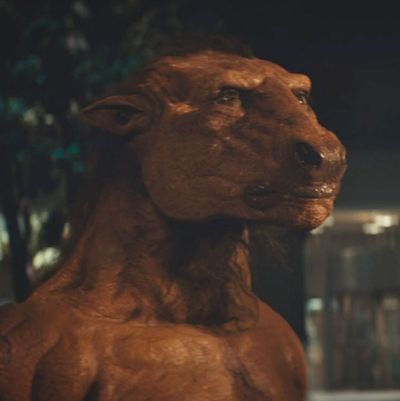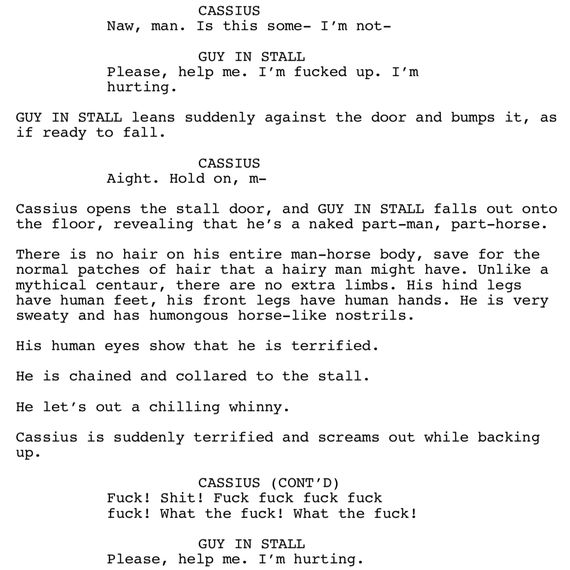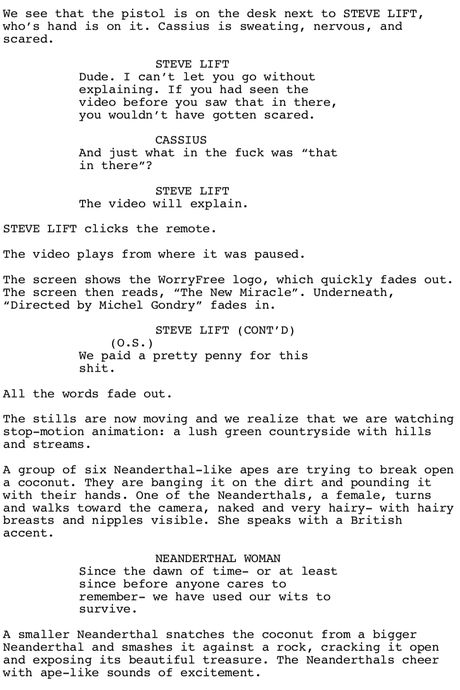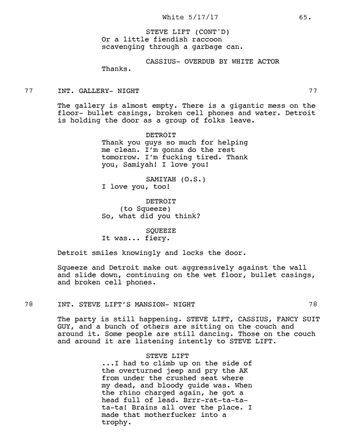
Once again, Vulture is speaking to the screenwriters behind the awards season’s most acclaimed movies about the scenes they found most difficult to crack. For this installment, writer and director Boots Riley chose to unpack the most startling sequence in his film Sorry to Bother You: the reveal of the equisapiens. Beyond the obvious shock value, Riley knew he needed an extraordinary turn of events to knock his protagonist, Cassius Green, out of his life as a lackey for the ominous corporate giant WorryFree. But how do you raise the stakes when you’ve already got people openly selling slave labor at their day jobs? Here, Riley breaks down the process of crafting the essential madness of Cassius’s great awakening.
There’s a section I would say that’s hardest, as opposed to one scene, and for me that had to do with being at Steve Lift’s mansion, at the party. I knew all along that what I wanted to happen was for Cassius to come to an understanding, and through that understanding, get on what I see as the right side of the struggle. For me, I don’t believe that happens in real life through someone convincing you that something is right, or through some sort of peer pressure. Being an organizer, I know that’s not how it happens. It has to do with people understanding where their actual power is, but that starts with their view of themselves and where they stand in the world and who they want to be. So I felt like, by this part of the movie, I needed Cassius to see himself, so I wrote the rap scene for that.
Now, me introducing him to Steve Lift, that was kind of the easy part, but the hard part was, How would I get Cassius to see himself? So at first I wrote the rap, because the crowd at the party is saying he must be this certain image of a black person that they know, and he does it because he wants to be accepted. Through that, the crowd does the “nigga shit” chant, and he comes to a realization of who he is now. I thought that that was going to be the turning point in the movie, “Okay, this is him seeing himself,” but I sat with it for a day because something didn’t feel right.
I realized that in a lot of movies, that was enough, and mine would have been shorter and simpler that way, but I had already built this crazy world that was heightened. There were already people selling slave labor. Cassius is doing that, and people are accepting this in that world. Is him figuring out that folks in the corporate world are using him to see their version of blackness enough for him to turn himself around after all this? It didn’t make any sense. I felt I needed to respect the world that I had already set up. I realized that there had to be something much deeper. I needed something that would shock Cassius to his mortal core. Anything short of that, had it been me watching the movie, I would have felt that writer trying to get out of a pickle.
Chronologically, the equisapiens came after I wrote the rap scene, and I had to just get away from it for a day and just think about it: Am I really going to go there? Is this what the story needs? I didn’t start out being like, I’m going to make a monster movie! I’m going to make a science-fiction movie! I wanted the viewer to not only empathize with what Cassius is going through, but to actually experience what he’s going through as well, and I needed it to come from WorryFree, and I needed it to be discovered at that party. I used him going to the bathroom to catch people off guard, and hopefully shocked not only Cassius but the audience into understanding that there is something bigger than what they thought the world was.
After I wrote the rap scene, I knew it was good. I could’ve patted myself on the back and just went with it, but I needed it to go further. Obviously in the real world, people come to those realizations, so you could have that be a dialogue, but I realized that that’s boring. I’m tired of people trying to tell me how the world is in a conversation — in movies at least. If I’m going to watch a film, I want to experience something. I don’t want it to just be a filmed lecture.
For Cassius, I needed to tie the idea of exploitation into something that he felt in his body when he saw it. Genetic manipulation gets to people’s sense of self. The idea of it being workhorses — I was looking for something that also had to do with the way that I feel capitalism is making us right now, which is to be more efficient monsters, right? If you take a shit without doing emails at the same time, you’re meant to feel unproductive. So why horses? We think of a horse as something that’s for work. It’s in our language — horsepower. Also, I had a girlfriend at the time who was very into horses and claimed it wasn’t sexual, so that was probably one of the reasons it got into my head, and actual physical labor is part of the selling point of this company. So that’s where the equisapiens came in. I didn’t want to only have things come out in dialogue. We also needed to feel the Disneyfication of our exploitation, and stop-motion is something that has brought me joy since I was a kid. So I wanted to show the power of how an idea is presented. That happens throughout the movie, the renaming of things, the colorfulness. Things have just come where people are sharing bunk beds and it’s marketed as cool. But it’s not.
The main parts of this were all in the first draft, because how I write is, when I come to a part that I’m kind of stuck on, I’ll just sit and think about it for a day or two and then go on. Mainly what changed throughout are smaller things. I definitely had a lot of people doing really long monologues that made me seem clever. I didn’t have people reading it with the first draft, but I would do the electronic reading voice that’s on the computer. It’d be this weird cadence, but I’d get a sense of, Wow. We are in this guy’s monologue for a long time.
What helped me in the writing also was at the actual Sundance Directors Lab, I shot a version with all this crazy exposition and had to do a lot of editing. I had the actors saying all this stuff that just felt so necessary, and I didn’t realize it wasn’t until I was watching it. So that conversation between Steve Lift and Cassius got knocked down a lot, because nothing will get you to change something like embarrassment. We did some readings and I was sitting there cringing, like, Oh, God.
Basically, what we ended up seeing on the actual film, I had edited down in the Labs version. That experience got me to back off from some of the other things that I was fighting for throughout the movie, too. We published this as its own paperback book in 2014 through McSweeney’s, and you know, for that crowd it looks cool on paper. You’re reading it, so you can have all these monologues and stuff as long as it’s funny. But I realized the worst thing you can do is be like, “Okay, now we got all the information out, but we just bored everybody and nobody wants to be here.” A lot of people keep saying, “Well, this is his first screenplay,” but I think that the way that it happened — having the script published, having public readings, going through not only the Screenwriters Lab but the Directors Lab — having the experience of seeing how these words translate to the actual film helped me a lot. It helped me to be okay with cutting words. And then the experience of doing music for 20-something years, you realize it doesn’t matter how precious you feel about something; you’re going to feel bad when you play this thing at a club and nobody gives a fuck. You got it your way, but nobody cares.
Below, read the scripted version of the scenes:
Now see how the scenes play out in the finished film:

























